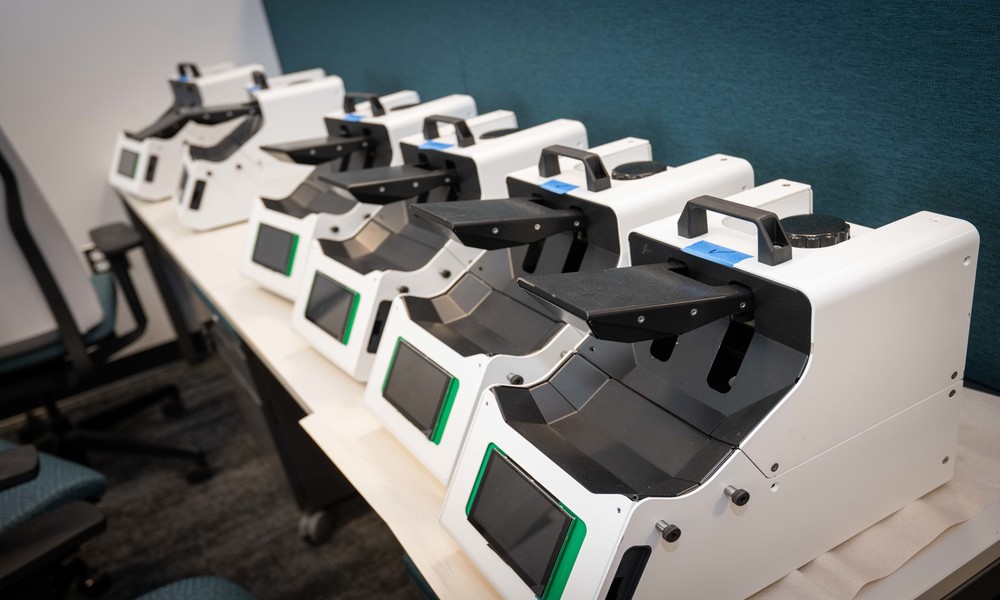The COVID-19 pandemic and its related research responses, vaccine development, and industry perspectives took center stage at the 2021 annual Global Public Safety Industry Forum where academic and industry experts also gained insight to help the world better prepare for future global health crises.
The Center for Global Public Safety is an inter-disciplinary research and innovation initiative established in 2016 by WPI in collaboration with Tsinghua University in Beijing to bring together industry leaders and universities from around the world to lead an integrated effort to improve global public safety.
Speaking in front of a backdrop with the words “Science Will Win,” a WPI alum now employed by Pfizer Inc. stressed the important role that science played in that company’s development of a COVID-19 vaccine.
“We literally moved at the speed of science to make this happen,” keynote speaker John F. Kelly ’82, vice president of Quality Operations and Environment, Health & Safety, told those attending the annual event, which focused on pandemic response and readiness and featured experts from academia and industry. “Science is relentless. It never gives up. It keeps asking questions until it finds what it’s looking for. Science never rests. It has to reinvent itself every day, prove itself again and again.”
Kelly began his remarks by discussing the vaccine and the steps the company took to make it possible. “By uniting transformational technology, cutting edge science, and the indomitable human spirit, Pfizer has been able to develop, manufacture and begin to supply one of the biggest medical advancements in the past 100 years,” he said.
Provost and Senior Vice President Wole Soboyejo earlier kicked off the event by detailing WPI’s health-related initiatives during the early days of the pandemic, including a team of researchers that created designs to turn inexpensive and readily available manual, hand-held, bag valve mask (BVM) resuscitators into automated ventilators. He cited a team from WPI’s Innovation and Entrepreneurship Center that 3D printed National Institutes of Health-approved face shields in the prototyping lab inside the Foisie Innovation Studio. He also noted that WPI’s Math and Science for Sub-Saharan Africa program (MS4SSA) helped provide partner institutions in Africa with 3-D printers to co-create a new ventilator design developed by a WPI professor, as well as online training at no cost to ramp up production of this medical device.
“It has been really remarkable how the WPI community reached out to the Worcester community and to people in other parts of the world, and now we’ve come to the point of being able to share our experiences during this forum,” Soboyejo said.
The forum also featured comments by Professor Hui Zhang, director, Public Safety Institute at Tsinghua University, who reflected on China’s response to the pandemic. He spoke about the role human movement played in the early part of the pandemic in China and in predicting the spread of virus in the country and around the world. Jean King, Peterson Family Dean of Arts & Sciences, moderated an academic-industry panel on “WPI’s COVID-19 Response; Industry Perspectives on the Pandemic and Readiness Moving Forward.” The participants were:
- Richard Schneider ’79, senior advisor to the CEO at Amphenol
- Kevin Seaver, executive general manager of Bioprocess Automation & Digital and Bioprocess Program Management at Cytiva
- Ron Lancaster, director of technology partnerships at Boston Scientific
- Dr. Shola Odusanya, of the African University of Science and Technology in Abuja, Nigeria
- Jane Li, WPI assistant professor of robotics engineering
- Kai Zhang, WPI assistant professor of robotics engineering
Li discussed her project to create an advanced and more user-friendly remote-controlled humanoid nursing robots that can perform many nursing-related tasks to aid in patient care when there’s a high risk of contagion or infection, such as COVID, staph, MRSA, hepatitis, and the flu.
Alum Schneider recounted the steps Amphenol took during the early days of the pandemic, including having to link global teams virtually and meet customer demand. Like Kelly, Schneider noted the importance of WPI’s exposing students to project-based learning and said it’s important for students to know how to learn “on the fly.”
The pandemic “created a whole set of completely new challenges that nobody expected,” he said. “We won’t know what the next challenge will be. How do you equip and empower the next generation of engineering leadership to be able to step into all the roles that we need to be able to address whatever that next challenge is?”
Kelly offered advice to WPI students planning on careers in the pharmaceutical or biotech industries. “The opportunities to do research when you’re at WPI as an undergraduate set you up for success. The value of an internship cannot be underestimated,” he said.
With photos of WPI on the Zoom screen, Kelly also complimented his alma mater and its signature project-based curriculum.
“I think back about my project-based educational experience at WPI and how well it positioned me for success,” he said. “It provided the right educational platform that I have taken with me throughout my career.”




